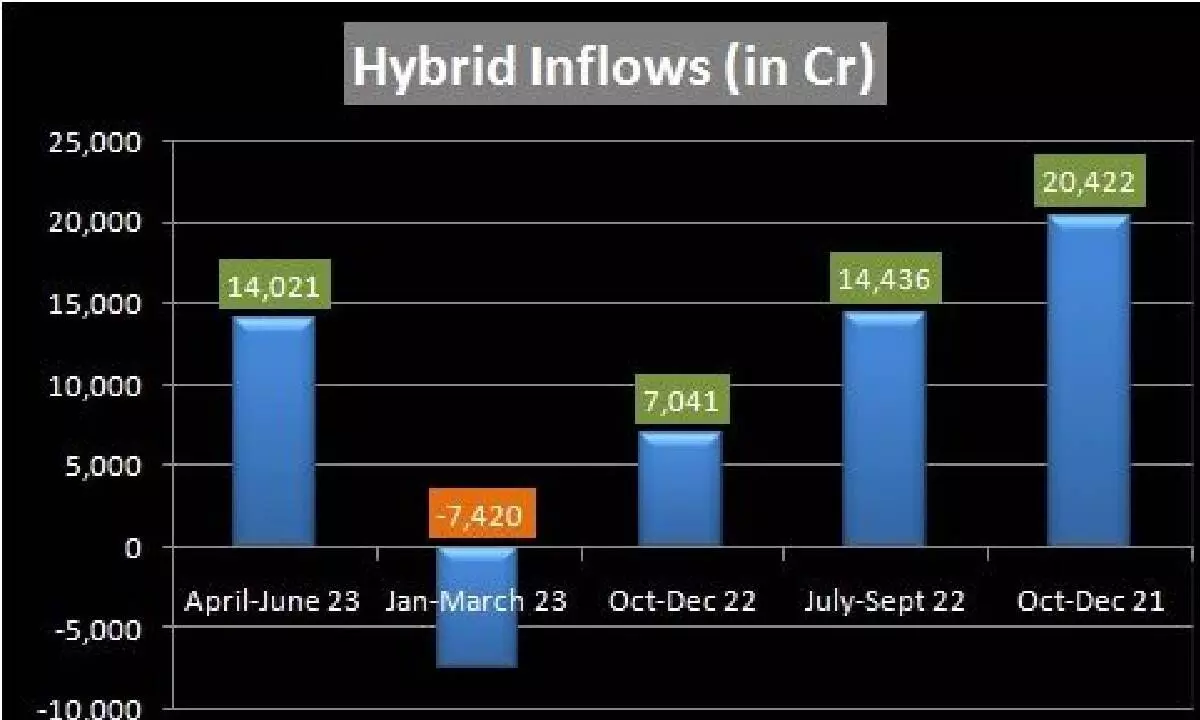Hybrid MF schemes gaining traction
At staggering inflow of Rs14,021 cr in June qtr amid a change in tax treatment for debt funds
image for illustrative purpose

New Delhi After witnessing incessant outflow for three consecutive quarters, hybrid mutual fund schemes have caught investors’ fancy and attracted over Rs14,000 crore for three months ended June, following a recent change in taxation for debt funds.
This was way higher than the Rs10,084 crore inflow seen in hybrid schemes in the April-June quarter of 2022, data from the Association of Mutual Funds in India (Amfi) showed. In addition, the asset base of hybrid funds and investors’ account or folio numbers of such schemes increased in the quarter under review. Hybrid funds are mutual fund schemes that typically invest in a combination of equity and debt securities and sometimes in other asset categories such as gold. These funds appeal more to investors with a moderate or low-risk profile. Hybrid funds are good investment options as they reduce the volatility associated when participating in equity markets while simultaneously providing stability in the fixed-income market.
Going by the data, hybrid funds witnessed an inflow to the tune of Rs14,021 crore in the June quarter this year after witnessing an outflow of Rs7,420 crore in the March quarter, Rs7,041 crore in the December quarter and Rs14,436 crore in the September quarter. The latest inflow also marks the highest fund infusion by investors since the quarter ended in December 2021, when such schemes attracted Rs20,422 crore inflow. Himanshu Kohli, Co-founder of Client Associates attributed the staggering inflow in hybrid schemes to a change in the tax treatment for debt funds. Investors have reduced their allocation to debt mutual funds while probably increasing their allocation to hybrid funds. “The annualized yields of arbitrage funds are above 7 per cent, and because their taxation is much more favorable than debt taxation, there is more traction in this category of funds,” he added. Given the recent change in taxation for debt funds, investors are looking to invest a portion of their fixed income exposure through hybrid funds, Kaustubh Belapurkar, Director - Manager Research, Morningstar India, said.
Under the new rules that kicked in from April 1, debt mutual funds held for more than three years will no longer enjoy indexation benefits. Indexation takes into account the inflation during the holding period of a mutual fund unit and consequently increases the purchase price of the asset and this reduces the tax. Of Rs14,000 crore inflow, 98 per cent of the total, or Rs13,721 crore came in from arbitrage funds during the quarter under review. The arbitrage category is predominantly dominated by institutional investors, and significant inflows and outflows are common in this category. However, due to the current highly attractive arbitrage spreads, the net flows in this category are currently the highest among hybrid funds, Radhika Gupta, MD and CEO of Edelweiss Asset Management said.
Morningstar India’s Belapurkar said that arbitrage funds enjoy equity taxation with fixed income-like returns and volatility, thus investors who are looking for investments in fixed income funds over 6-12 months have invested in arbitrage funds.

